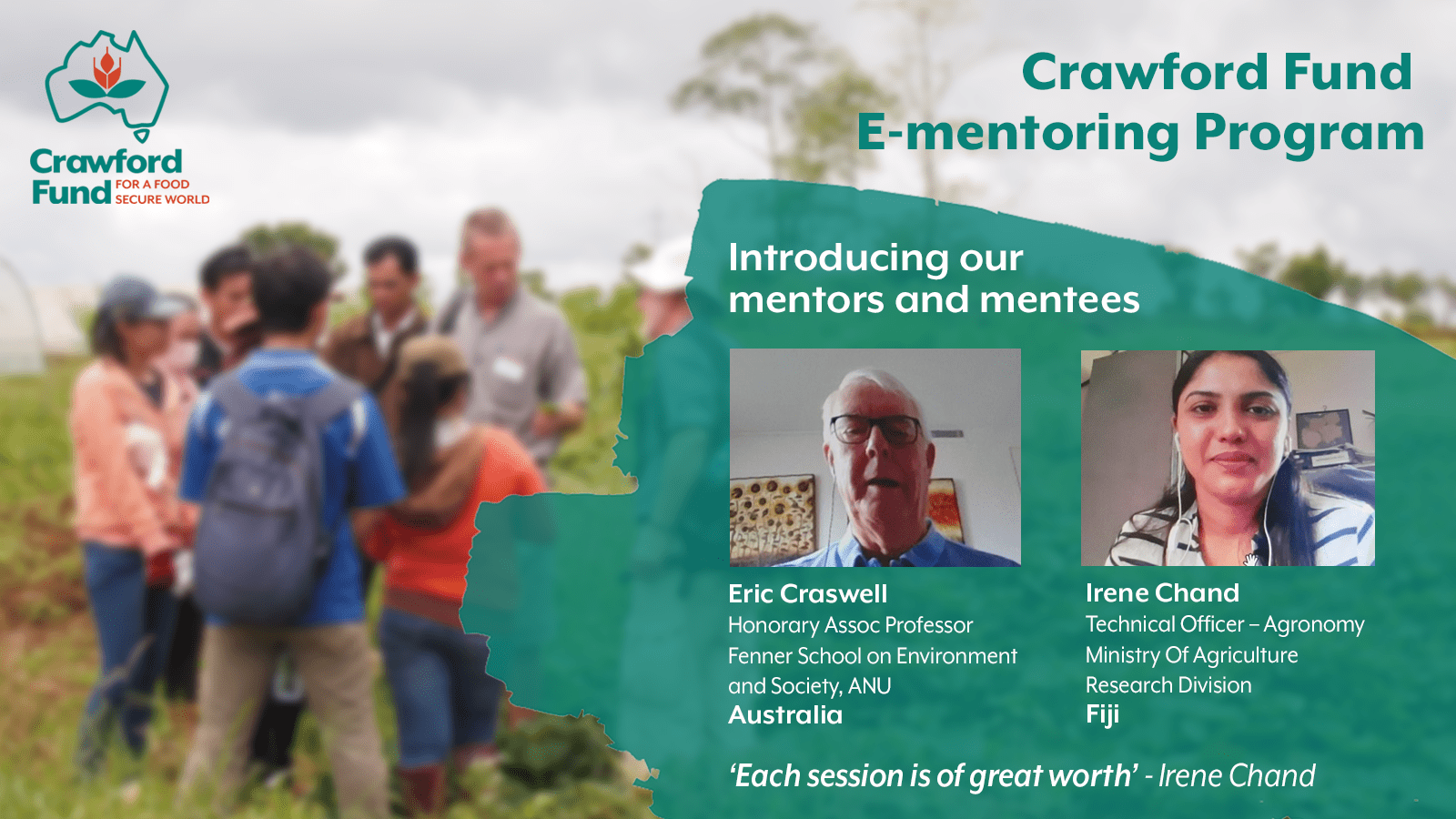

‘Each session is of great worth’ says Irene Chand about her e-mentoring experience
July 26, 2021

Late last year we announced our first group of e-mentors and e-mentees as part of our new E-mentoring Program. This program was launched to ensure that, despite COVID-19 and its travel and life restrictions, we could continue to help develop the technical and organisational skills and expertise of agricultural researchers, scientists and policy makers in developing countries.
This program builds on the success of our long term existing Mentoring Program, which has seen face-to-face interaction in overseas countries, backed up by electronic contact, and our conference scholar mentoring program, matching young NextGen researchers with experienced Australians who attend our conference.
We hope that these e-connections not only deliver positive and targeted skill-sharing outcomes, but also enduring connections between the Crawford Fund, the volunteering mentors and their mentees, and the institutions and countries involved.
We now present our latest e-mentoring pair reflecting on their experience, Honorary Associate Professor Eric Craswell, Fenner School of Environment and Society at the Australian National University (and the Crawford Fund’s former Director of Training) and his e-mentee Mrs Irene Chand, Technical Officer – Agronomy at the Fiji Ministry of Agriculture – Research Division.
You can also read earlier reflections from our e-mentors in Australia and their e-mentees in the Philippines, Ghana, Malaysia and the Philippines and Malaysia again!
E-MENTOR/E-MENTEE PAIRING – Eric Craswell (Australia) and Irene Chand (Fiji)
MENTOR
Eric Craswell
Honorary Associate Professor
Fenner School of Environment and Society, ANU
What motivated you to be a mentor?
I wanted to continue to contribute to international agricultural research by passing on some of my experience based on a career of 44 years.
What are the main goals you are focusing on from your agreed mentoring plan?
Long term goals centred on team orientation and time management whereas the short -term focus was on field experimentation and experimental plans for research on inorganic and organic fertilizers applied to rice.
What are the various ways you are communicating and what combination are you finding most useful?
Communications focussed on monthly Zoom meetings supported by email exchanges of meeting reports and scientific papers and books.
What are you getting out of our e-mentoring program?
The satisfaction of helping a promising scientist and gaining new knowledge about the challenges facing a researcher working on rice experimentation in relative isolation.
Any lessons you could share with the other e-mentors?
Care needs to be taken to avoid leading the agenda while proactively guiding the discourse in areas of mutual interest.
Anything more to add?
CF should be commended for devising this scheme, particularly given that the pandemic has disrupted the normal communications available.
MENTEE
Irene Chand
Technical Officer – Agronomy
Ministry of Agriculture, Research Division, Fiji
What motivated you to nominate to be a mentee?
I was nominated by Permanent Secretary for Ministry of the Agriculture to be the mentee under this programme and I am glad to accept the nomination as it is one of my best decisions.
What are the main goals you are focusing on from your agreed mentoring plan?
- To attain the knowledge on soil nutrient and plants nutrient uptake.
- To get vast knowledge to best of my ability to understand the soil nutrient characteristics in wetland and dryland paddy fields. Influence of organic and inorganic fertilizers contributing to presence of macro and micro elements in soil Agronomic systems.
- To learn how to manage work, time and attain skills in leadership
How is the e-mentoring helping your development?
This mentoring is of great help, as my mentor is well experienced in soil nutrient and its properties and has vast knowledge in enzyme activities in paddy soils and shares all knowledge through, sending me research papers, explaining the contents with example from different countries, and answers my questions to the best of his ability for me to understand the concept. Each session is of great worth as I am able to understand the nutrient transformation in soil and rice plant. I was able to learn how to use google scholar for researching on papers and articles on Agriculture rice production. My mentor provided me with books on experimental layout and designing. These sessions have not only upgraded my scientific knowledge, however, I am able to gain skills about developing my career, networks, problem-solving abilities and leadership and management skills especially time, workers and learn on proper planning and timelines.
Any lessons you could share with the other e-mentees?
This mentoring session are worthwhile, so do not take it for granted. Try to make the most of this opportunity to attain knowledge from the expertise by asking as many questions as possible. Online is not a problem or excuse, the zoom meetings have made face to face communications easier and it is high value. It is important to understand that your mentor is giving up his or her time to help, so please try your best to attend planned virtual meetings and to respond to their emails and requests for any required information. This will be of great worth.
Anything more to add?
Highly appreciate the Crawford Fund eMentoring Program for giving me this opportunity to be part of this online programme.




 0
0